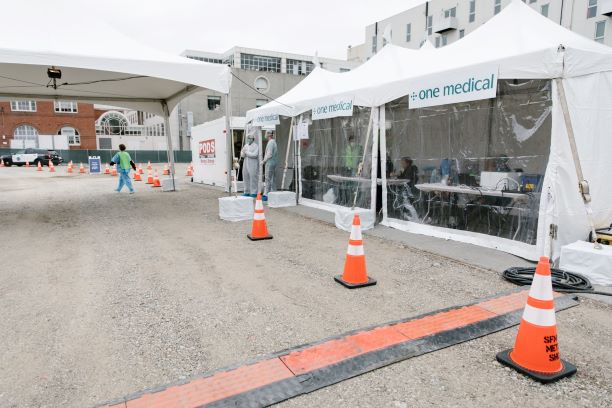
Providers administer Covid-19 tests at a drive-thru testing site run by One Medical in San Francisco. The county stopped sending vaccine doses to One Medical in February after reports that it had been letting ineligible patients get vaccines ahead of healthcare workers. Photo credit: One Medical
As lawmakers call for an investigation of One Medical for letting some of its members jump the line for Covid-19 vaccines, several California counties are dropping it as a partner as they ramp up vaccinations. San Francisco County — where One Medical is based — Los Angeles County, Alameda County and Washington state have all stopped working with the concierge primary care company.
Health departments across the country had allocated thousands of doses to One Medical to administer to eligible patients. But in California, where testing sites were tasked with verifying eligibility, the company did not ask for any evidence that the people it vaccinated were healthcare workers, Forbes reported last month.
The company may have also been offering vaccines to its staff working from home, as well as friends and family of its leadership, according to an NPR investigation where it reviewed internal messages between One Medical providers.
A House subcommittee overseeing the Covid-19 crisis sent a letter to One Medical this week, seeking more information about the company’s vaccine administration practices.
California counties stop working with One Medical
MedCity News received confirmation from three counties that they had stopped using One Medical as a vaccine provider:
San Francisco’s Department of Public Health (DPH) said it had initially picked One Medical because it had the capacity to provide high-throughput community sites and had been registered in the state’s enrollment system.
In mid-February, after the Forbes article broke, the county asked One Medical to provide a full accounting of the vaccines it had administered.
“One Medical’s response indicates a number of doses were administered to patients who were under 65 who self-identified as Phase 1a Health Care Workers, but were not (in-home supportive services) workers, DPH referrals, or One Medical health care worker employees,” the department wrote in an email. “Because of this and our inability to verify the 1a status of this cohort, DPH has stopped allocating doses to One Medical.”
On Feb. 22, San Francisco’s Department of Public Health told One Medical to return 1,620 doses. The company was allowed to retain enough to provide second shots to people who had received their first.
LA County Public Health struck a partnership with One Medical in January for similar reasons to its northern counterpart. In total, the company received doses to vaccinate 5,612 people. But in a Thursday email, the department confirmed it was no longer working with One Medical.
Orange County also said on Friday it had distributed 600 doses to One Medical, but stopped sending them vaccines in late January due to supply limitations.
One Medical did not respond to requests for comment. In a letter released by CEO Amir Dan Rubin on Wednesday, the company said it would require in-person vaccine eligibility verification, and make it more clear that access to vaccine appointments is free.
The company, which normally charges a $199 membership fee for its primary care services, was requiring eligible vaccine candidates to register for a 90-day free trial to schedule an appointment. Some Washington D.C. residents who were routed to One Medical through DC Health’s vaccine registration portal also ran into questions about whether they’d have to pay the membership fee.
House subcommittee launches investigation
Now, the House Select Subcommittee on the Coronavirus Crisis is seeking more information on how One Medical oversaw vaccine administration and a breakdown of who the company has vaccinated.
Rep. James Clyburn (D- S.C.), chairman of the subcommittee, raised concerns in a letter sent Monday to Dan Rubin about reports that One Medical let some members skip the line ahead of healthcare workers and that eligible patients thought they had to pay for membership.
“Despite being warned that the company’s lax oversight of vaccine eligibility rules was allowing ineligible patients to jump the line, OneMedical has reportedly failed to promptly implement an effective protocol to verify eligibility and instructed staff not to police eligibility,” he wrote. “As a result of these irresponsible practices, numerous authorities have now halted distributions of vaccine doses to the company.”
One Medical went public last year at a $2.7 billion valuation. Since then, the company’s stock has nearly doubled, though it fell last month on news of the investigation and a flat earnings outlook.
In a February earnings call, Dan Rubin told investors that the company was registered as a vaccine provider with more than 30 different jurisdictions. It’s not clear where the company is still administering vaccines.
One Medical recently published an update on its website, but only indicated that it was “temporarily out of first dose vaccines” for San Francisco, Alameda, Los Angeles County and other counties that said they had dropped One Medical as a vaccine partner.
The company still appears to be working with D.C. and New York City. Both cities did not respond to requests for comment by the time of publication.















